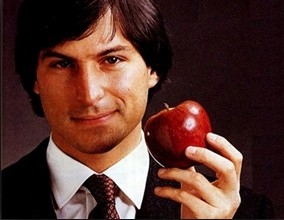Wayne then got cold feet. As Jobs started planning to borrow and spend more money, he recalled the failure of his own company. He didn’t want to go through that again. Jobs and Wozniak had no personal assets, but Wayne (who worried about a global financial Armageddon) kept gold coins hidden in his mattress. Because they had structured Apple as a simple partnership rather than a corporation, the partners would be personally liable for the debts, and Wayne was afraid potential creditors would go after him. So he returned to the Santa Clara County office just eleven days later with a “statement of withdrawal” and an amendment to the partnership agreement. “By virtue of a re-assessment of understandings by and between all parties,” it began, “Wayne shall hereinafter cease to function in the status of ‘Partner.’” It noted that in payment for his 10% of the company, he received $800, and shortly afterward $1,500 more.
之后韋恩就退縮了。喬布斯開始計劃借入并花掉更多的錢,韋恩便想起了以前自己公司失敗的教訓(xùn),他不想再經(jīng)歷一次那樣的過程。喬布斯和沃茲都沒有個人資產(chǎn),但韋恩在他的床墊里藏了金幣(他擔(dān)心世界經(jīng)濟(jì)崩潰)。因為構(gòu)成蘋果公司的是非常簡單的合伙人關(guān)系,而不是公司體系,所以合伙人個人需要對債務(wù)負(fù)責(zé)任,因此韋恩擔(dān)心潛在的債權(quán)人會向自己追債。所以11天之后,他就回到了圣克拉拉的辦公室里,帶著一份“退出聲明”和一份合作協(xié)議修正案。“經(jīng)過協(xié)議各方的重新評估,”修正案開頭說,“韋恩將不再以‘合伙人’身份參與公司運(yùn)作。”文件中提到,作為對他持有的10%公司股份的回購,他得到了800美元,此后不久又得到了1500美元。
Had he stayed on and kept his 10% stake, at the end of 2010 it would have been worth approximately $2.6 billion. Instead he was then living alone in a small home in Pahrump, Nevada, where he played the penny slot machines and lived off his social security check. He later claimed he had no regrets. “I made the best decision for me at the time. Both of them were real whirlwinds, and I knew my stomach and it wasn’t ready for such a ride.”
如果當(dāng)初他留在了蘋果公司并繼續(xù)持有這10%的股份,那么到2010年底這些股票的價值是大約26億美元。然而,現(xiàn)在他住在內(nèi)華達(dá)州帕朗市的一座小房子里,玩玩老虎機(jī),靠社會保險金度日。他宣稱自己毫不后悔。“我作了當(dāng)時對我最有利的選擇,”他說,“他們兩個都是瘋狂的家伙,我知道自己的承受能力,我不準(zhǔn)備冒那樣的險。”
Jobs and Wozniak took the stage together for a presentation to the Homebrew Computer Club shortly after they signed Apple into existence. Wozniak held up one of their newly produced circuit boards and described the microprocessor, the eight kilobytes of memory, and the version of BASIC he had written. He also emphasized what he called the main thing: “a human-typable keyboard instead of a stupid, cryptic front panel with a bunch of lights and switches.” Then it was Jobs’s turn. He pointed out that the Apple, unlike the Altair, had all the essential components built in. Then he challenged them with a question: How much would people be willing to pay for such a wonderful machine? He was trying to get them to see the amazing value of the Apple. It was a rhetorical flourish he would use at product presentations over the ensuing decades.
蘋果公司正式成立之后不久,喬布斯和沃茲尼亞克就共同登臺,在家釀計算機(jī)俱樂部進(jìn)行了一次演示。沃茲展示了他們最新生產(chǎn)出來的一塊電路板,描述了上面使用的微處理器、8Kb的內(nèi)存,以及他編寫的BISIC語言的程序版本。他還強(qiáng)調(diào)了“關(guān)鍵部件”是人性化的鍵盤,而不再是笨重的、讓人困惑的由大堆燈泡和開關(guān)組成的面板。然后輪到喬布斯講話。他指出蘋果的產(chǎn)品與阿爾泰不同,所有的關(guān)鍵元部件都已經(jīng)內(nèi)置在機(jī)器中了。然后他問了大家一個問題:人們愿意花多少錢來購買這么一臺完美的機(jī)器?他是在努力讓大家看到蘋果電腦的驚人價值。這是他在后來幾十年的產(chǎn)品發(fā)布會上一直沿用的華麗辭藻。
The audience was not very impressed. The Apple had a cut-rate microprocessor, not the Intel 8080. But one important person stayed behind to hear more. His name was Paul Terrell, and in 1975 he had opened a computer store, which he dubbed the Byte Shop, on Camino Real in Menlo Park. Now, a year later, he had three stores and visions of building a national chain. Jobs was thrilled to give him a private demo. “Take a look at this,” he said. “You’re going to like what you see.” Terrell was impressed enough to hand Jobs and Woz his card. “Keep in touch,” he said.
然而觀眾并不是很感興趣。蘋果電腦使用的是二流的微處理器,而不是英特爾8080。但是有一個重要人物留了下來,想要獲得更多信息。他的名字叫保羅·特雷爾(PaulTerrell),1975年他開了一家電腦商店ByteShop,就在門洛帕克的國王大道上。而一年之后的現(xiàn)在,他已經(jīng)有了三家店,并且計劃將其發(fā)展為全國連鎖。喬布斯非常興奮能給他私下作演示。“看看吧,”他說,“你會喜歡上你看到的東西。”特雷爾看后印象深刻,把自己的名片給了喬布斯和沃茲。他說:“保持聯(lián)系。”
“I’m keeping in touch,” Jobs announced the next day when he walked barefoot into the Byte Shop. He made the sale. Terrell agreed to order fifty computers. But there was a condition: He didn’t want just $50 printed circuit boards, for which customers would then have to buy all the chips and do the assembly. That might appeal to a few hard-core hobbyists, but not to most customers. Instead he wanted the boards to be fully assembled. For that he was willing to pay about $500 apiece, cash on delivery.
“我來跟你聯(lián)系了。”第二天,喬布斯說著這句話赤腳走進(jìn)了ByteShop。他做成了買賣。特雷爾同意訂購50臺電腦。但是有一個條件。特雷爾并不想要只值50美元的印刷電路板,因為顧客買了這個之后還要再去買芯片然后自己組裝。這也許能吸引一些狂熱的愛好者,但大多數(shù)顧客不愿意這么麻煩。他要的是完全組裝好的產(chǎn)品。為此他愿意每臺出價500美元,貨到付款,現(xiàn)金結(jié)賬。
Jobs immediately called Wozniak at HP. “Are you sitting down?” he asked. Wozniak said he wasn’t. Jobs nevertheless proceeded to give him the news. “I was shocked, just completely shocked,” Wozniak recalled. “I will never forget that moment.”
喬布斯立刻給還在惠普的沃茲打了電話。“你現(xiàn)在坐著嗎?他問。沃茲回答說沒有。不管怎樣喬布斯還是把消息告訴了他。“我被震住了,完全靂住了,”沃茲尼亞克回憶說,“我永遠(yuǎn)都忘不了那一刻。”
To fill the order, they needed about $15,000 worth of parts. Allen Baum, the third prankster from Homestead High, and his father agreed to loan them $5,000. Jobs tried to borrow more from a bank in Los Altos, but the manager looked at him and, not surprisingly, declined. He went to Haltek Supply and offered an equity stake in Apple in return for the parts, but the owner decided they were “a couple of young, scruffy-looking guys,” and declined. Alcorn at Atari would sell them chips only if they paid cash up front. Finally, Jobs was able to convince the manager of Cramer Electronics to call Paul Terrell to confirm that he had really committed to a $25,000 order. Terrell was at a conference when he heard over a loudspeaker that he had an emergency call (Jobs had been persistent). The Cramer manager told him that two scruffy kids had just walked in waving an order from the Byte Shop. Was it real? Terrell confirmed that it was, and the store agreed to front Jobs the parts on thirty-day credit.
為了完成訂單,他們需要價值15000美元的零部件。在家園高中和他們一起搞惡作劇的艾倫·鮑姆以及他的父親,愿意借給他們5000美元。喬布斯想從洛斯阿爾托斯的一家銀行借一些錢,但銀行經(jīng)理看了看他,不出所料,拒絕了。他去了哈爾泰克商店,提出拿蘋果公司的股杈換取一些零部件,但商店老板認(rèn)為他們只是“兩個年輕的邋遢小子”,也柜絕了。雅達(dá)利的奧爾康愿意賣給他們芯片,但必須預(yù)付現(xiàn)金。最終,喬布斯說服克拉默電子公司(CramerElectronics)的經(jīng)理親自打電話給保羅·特雷爾,確認(rèn)對方是否真的下了一個25000美元的訂單。當(dāng)時特雷爾正在開會,他聽到喇《八里在叫他,說有緊急來電(喬布斯不停地打電話)。克拉默公司的經(jīng)理對他說,兩個衣著邋遢的小子走進(jìn)自己的店里,揮舞著一張ByteShop的訂單。訂單是真的嗎?特雷爾確認(rèn)了訂單的真實性,克拉默商店同意將零件預(yù)支給他們,賬期30天——
注釋:
①蘋果公司當(dāng)時名為AppleComputer,之后公司名稱中去掉了Computer。











